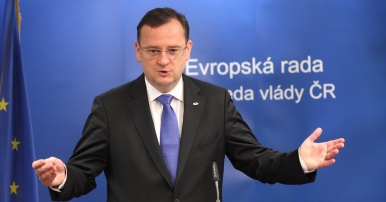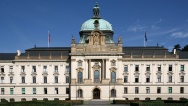Press Advisories
22. 5. 2013 22:44
Renewable resources should not be a brake on the economy of Europe
Prime Minister Petr Nečas expressed his appreciation for the fact the topic of energy had been included in the agenda for the European Council meeting and the fact that a joint approach was adopted by the countries of the Visegrad group. In his words this is a topic of fundamental importance for growth and competitiveness in the whole of the European Union. The more so for the Czech Republic as a country whose gross domestic product is generated to a large extent by industries which are critically dependent on energy.
“I emphasised the right of member states to choose their own energy mix and the right to make use of their own resources, including the responsibility of member states to secure reliable deliveries on their own territory,” said Prime Minister Nečas, adding “the completion of the internal energy market is priority number one”. A prerequisite for this is the implementation of current legislation. “The Czech Republic sees as urgent the full implementation of the 3rd energy package in all member states. We welcome the fact that this priority is reflected in the European Council’s conclusions” he states.
The completion of a fully functional internal energy market is still prevented, in the Czech Prime Minister’s opinion, by a number of further obstacles such as unplanned electricity overflows, which threaten network stability and the integrity of the common market. “I consider it a great success that we have succeeded in getting this problem included in the European Council’s conclusions,” Petr Nečas emphasised.
We support investment in energy
The European Council’s conclusions also refer to investment in energy. In the view of the Czech government there is a need to invest in infrastructure as well as in generation capacity. Prime Minister Nečas also noted that it is actually in relation to generating capacities that the current situation is in many respects unclear for investors.
“The task of the European Union should be to create the kind of environment in which it pays to invest in energy. This means all investment and not just that into supported energy sources,” he said in this context and emphasised that the promotion of, for example, renewable energy resources must not threaten individual transmission networks. “I am glad that we have been able to add this marked accent between renewable resources and the stability of transmission networks to the summit’s conclusions” he added.
The question of state aid is closely linked to the topic of investment. The Czech Republic is requesting that public support is provided in a balanced manner and based on the principle of technological neutrality, with its rules respecting the specific conditions in the different member states.
“We consider it fundamental that we have succeeded in maintaining the principle of respect for the openness of the rules for state aid for all low-emissions energy resources. So overall the summit’s conclusions on energy are an acceptable compromise from the Czech Republic’s point of view”, Petr Nečas noted.
Our aim is competitiveness on energy prices
The Czech Republic is not averse to a discussion on the climate and energy framework of the EU up to 2030. Any discussion on this cannot be held separately from negotiations on a new agreement on climate protection at a global level. Any possible future commitments must not fall unilaterally only on the EU, thus damaging its competitiveness.
On the question of diversity of supply and energy sources, in the Czech Republic’s view it is a matter not only of energy security and competitiveness but also of the sustainable use of resources. The Czech Republic considers it important for all of these aspects to be kept constantly in balance.
For the Czech Republic a long-term priority is competitiveness. In this respect, according to the Czech Prime Minister, it is necessary to keep in view high energy prices and their impact both on households and on business.
“Behind the rise in energy prices is, among other things, excessive regulation, especially in the area of renewable energy resources. Today in Europe it does not pay to invest in classical sources of energy, including for example gas-steam power stations. We need to consider what energy resources of our own we have available in Europe, and which we can use for energy generation so that energy prices do not rise, but as far as is possible, fall”, Prime Minister Nečas noted, adding that thanks to high energy prices Europe is losing competitiveness. This fact is then accompanied by excessive regulation, for example in the area of climate change. “In essence we are experiencing the collapse of the emissions permit system and Europe is burdened by this, without global agreement with the economies of the USA, China and India which are growing faster in part because they have cheaper energy”, Petr Nečas added.
Prime Minister: we are against harmonisation of direct taxation
Today the European Council today dealt with taxes in addition to energy. Before the meeting Prime Minister Nečas stated that the Czech Republic supports initiatives acting against tax evasion and direct and indirect tax fraud, and in particular the achievement of solutions to tax evasion on VAT.
However in his words the Czech government will not support any European Union proposals for the tax harmonisation of direct taxes, involving for example tax rates and tax allowances. “The fight against tax evasion has our support, but on the other hand this should not lead to direct taxes being unified or harmonised, either in the area of tax rates or tax allowances. The fight against tax evasion conceals a stubborn effort to harmonise the taxable base income and direct tax rates, and we are not in favour of this. Our efforts are focussed on limiting tax evasion. The idea that some kind of list resolves something, or that greater pressure for direct tax harmonisation is the right step, we do not share that idea”, the Czech Prime Minister stated.
From the standpoint of the Czech Republic a further priority, reflected in the summit’s conclusions, is the adoption of a package of measures against VAT fraud and a directive on the taxation of savings, as will as automatic information exchange.







